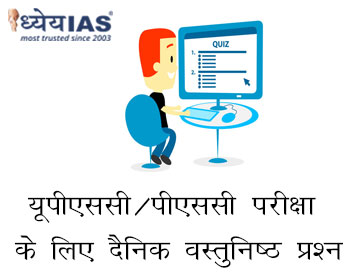Current Affairs MCQs Quiz for UPSC, IAS, UPPSC/UPPCS, MPPSC. BPSC, RPSC & All State PSC Exams
Date: 09 June 2022
Q1. Consider the following statements:
1. In a cognizable offence, police can arrest the convict
without a warrant and can start an investigation without the permission of the
court.
2. Copyright infringement is a cognisable offence under the Code of Criminal
Procedure (CrPC), 1973.
Which of the statement/s given above is/are correct?
a) 1 only
b) 2 only
c) Both 1 and 2
d) Neither of these
Answer: (C)
Explanation:
- A cognizable offence is an offence in which the police officer as per the first schedule or under any other law for the time being in force, can arrest the convict without a warrant and can start an investigation without the permission of the court.
- Supreme Court of India has passed a far-reaching judgment resolving the question of whether copyright infringement, which is punishable with imprisonment for a term which may extend up to three years under the Copyright Act of 1957, is a cognisable offence under the Code of Criminal Procedure (CrPC), 1973.
Q2. Project SAANJH sometimes seen in news is related to:
a) Community Policing
b) Farmer’s welfare program
c) Program for upliftment of rural women
d) None of the above
Answer: (A)
Explanation: SAANJH: A Community Policing in Punjab has been adopted as a philosophy and draws inspiration from the insight of the visionary Robert Peel that the Police are the public and the public is the police.
Q3.Consider the following statements:
1. The share of digital transactions contribute to 80% of
merchant transactions.
2. UPI is currently the single largest retail payment platform in the country in
terms of volume of transactions.
Which of the statement/s given above is/are correct?
a) 1 only
b) 2 only
c) Both 1 and 2
d) Neither of these
Answer: (B)
Explanation:
- The share of digital transactions contribute to 40% of merchant transactions.
- Unified Payments Interface or UPI is currently the single largest retail payment platform in the country in terms of volume of transactions, indicating its wide acceptance, said the Economic Survey 2021-22. UPI carried out 4.6 billion transactions worth Rs 8.26 lakh crore in December 2021.
Q4. Consider the following statements:
1. In Budget 2022-23, more amount has been allocated to be
spent on central sector schemes than on central sponsored schemes.
2. The Department of Economic Affairs is responsible for overseeing the public
financial management system in the Central Government and matters connected with
state finances.
Which of the above statement(s) is/ are correct?
a) 1 only
b) 2 only
c) Both 1 and 2
d) Neither 1 nor 2
Answer: (A)
Explanation:
- More amount will be spent on Central Sector Schemes (Rs 13.56 L Cr) than on Central Sponsored Schemes (Rs 3.83 L Cr) as per Union Budget 2022-23.
- The Department of Expenditure is responsible for overseeing the public financial management system in the Central Government and matters connected with state finances.
Q5. Consider the following statements regarding BIMSTEC:
1. It has five countries from South Asia and two from
Southeast Asia.
2. The Northeastern States of India share a border with three BIMSTEC nations.
3. Nepal and Bhutan are its founding member since 1997.
Which of the statements given above is/are correct?
a) 1 and 2 only
b) 1 only
c) 2 and 3 only
d) 1 ,2 and 3
Answer: (B)
Explanation:
- It was founded as BIST-EC, in June 1997, with the adoption of the Bangkok Declaration, with Bangladesh, India, Sri Lanka, and Thailand as members.
- It became BIMST-EC (Bangladesh, India, Myanmar, Sri Lanka, and Thailand Economic Cooperation) with the entry of Myanmar in late 1997 and eventually, it was named in its current form, when Nepal and Bhutan became members in 2004.
- The Northeast states share a border with four BIMSTEC nations namely, Bangladesh, Bhutan, Nepal, and Myanmar.








